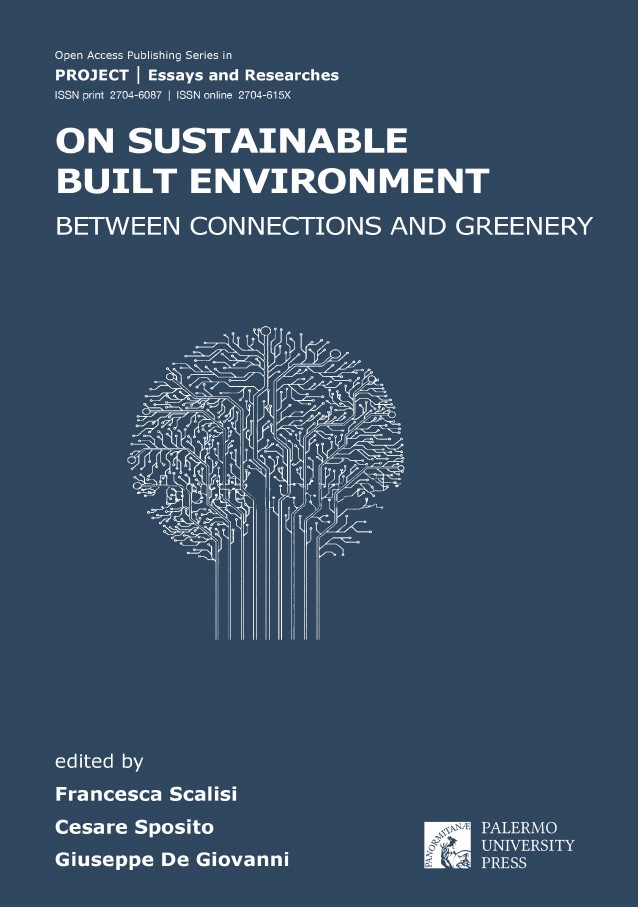
Title
Nature and Heritage. Approaches to transform urbanised water landscapes
DOI
doi.org/ 10.19229/978-88-5509-446-7/752022
Keywords
landscape, territory, urbanised environment, nature, heritage
Abstract
Each design project on the water landscape requires the acquisition of a specific behaviour towards nature: clarifying the requirements of the observed attitudes is fundamental to considering which value system should be shared in the ecological conversion of the urbanised environment. Among the most used approaches, the contrast between an anthropocentric and ecocentric debate shows the existence of a crippling dichotomy between nature and culture, that some environment-oriented approaches try to mend and overcome. In the experiments aimed at this objective, the heritage has a crucial role in the territory project, even with the wide range of interpretations and practices, as it emerges from the analysis of three case studies: the new paradigms originated in the Netherlands in river and heritage management, the experience of the Landscape Observatory of Catalonia catalogues, and the Territorialist School’s concept of territorial heritage.
Section
Architecture | Essays & Viewpoint
pp. 84-97
Author(s)
Giulia Luciani
Author(s) Biography
Giulia Luciani, Engineer, is a PhD Candidate in Infrastructures and Transport at the Department of Civil, Building and Environmental Engineering (DICEA) at the ‘Sapienza’ University of Rome (Italy). Her PhD thesis, entitled ‘Complex legacies – Urbanised deltas between waters, heritages, cities’, focuses on the historic relations between man-made environment and water thresholds. Mob. +39 334/355.25.95 | E-mail: giu.luciani@uniroma1.it
References
Barca, S. (2020), Forces of Reproduction – Notes for a Counter-Hegemonic Anthropocene, Cambridge University Press, Cambridge. [Online] Available at: doi.org/10.1017/9781108878371 [Accessed 20 July 2022].
Berque, A. (2016), La pensée paysagère, Èditions Èoliennes, Bastia.
Brown, J., Mitchell, N. and Beresford, M. (eds) (2004), The Protected Landscape Approach – Linking Nature, Culture and Community, IUCN, Gland-Cambridge. [Online] Available at: portals.iucn.org/library/sites/library/files/documents/2005-006.pdf [Accessed 20 July 2022].
Calzolari, V. (1999), Storia e natura come sistema – Un progetto per il territorio libero dell’area romana, Argos, Roma.
Choay, F. (2008), Del destino della città, Alinea, Firenze.
Fairclough, G. (2016), “Al lloc adequat, en el moment adequate – L’aigua en els paisatges humans”, in Nogué, J., Puigbert, L. and Bretcha, G. (eds), Paisatge, patrimoni i aigua – La memòria del territori, Observatori del paisatge de Catalunya, Olot, pp. 12-34. [Online] Available at: catpaisatge.net/fitxers/publicacions/aigua/Reflexions%204_aigua_WEB.pdf [Accessed 20 July 2022].
Fava, A. and Caputi, A. (2018), “Elena Croce – Cultura militante e difesa dell’ambiente”, in La camera blu, issue 18, pp. 6-28. [Online] Available at: doi.org/10.6092/1827-9198/5693 [Accessed 20 July 2022].
Hein, C. (ed.) (2020), Adaptive strategies for water heritage – Past, present and future, Springer Open. [Online] Available at: doi.org/10.1007/978-3-030-00268-8 [Accessed 20 July 2022].
ICOMOS/ICORP (2013), Heritage and resilience – Issues and opportunities for reducing disaster risks. [Online] Available at: whc.unesco.org/en/events/1048/ [Accessed 20 July 2022].
Latour, B. (2020), La sfida di Gaia – Il nuovo regime climatico [or. ed. Face à Gaïa – Huit conférences sur le nouveau régime climatique, 2015], Meltemi, Milano.
Latour, B. (2018), Non siamo mai stati moderni [or. ed. Nous n’avons jamais été modernes, 1991], Elèuthera, Milano.
Lyle, J. T. (1994), Regenerative design for sustainable development, Wiley, New York.
Magnaghi, A. (2020), Il principio territoriale, Bollati Boringhieri, Torino.
Magnaghi, A. (2001), “Una metodologia analitica per la progettazione identitaria del territorio”, in Magnaghi, A. (ed.), Rappresentare i luoghi. Metodi e tecniche, Alinea, Firenze, pp. 1-40. [Online] Available at: lapei.it/?page_id=568 [Accessed 22 July 2022].
Marson, A. (2008), Archetipi di territorio, Alinea, Firenze. [Online] Available at: lapei.it/?page_id=997 [Accessed 20 July 2022].
Martin-Ortega, J., Ferrier, R. C., Gordon, I. J. and Khan, S. (eds) (2015), Water Ecosystem Services – A Global Perspective, Cambridge University Press, Cambridge. [Online] Available at: unesdoc.unesco.org/ark:/48223/pf0000244743 [Accessed 20 July 2022].
Meyer, H., Nijhuis, S. and Bobbink, I. (eds) (2010), Delta Urbanism – The Netherlands, APA, Chicago-Washington, DC.
Morton, T. (2016), Dark ecology – For a logic of future coexistence, Columbia University Press, New York-Chichester.
Nogué, J., Puigbert, L. and Bretcha, G. (eds) (2016), Paisatge, patrimoni i aigua – La memòria del territori, Observatori del paisatge de Catalunya, Olot. [Online] Available at: catpaisatge.net/fitxers/publicacions/aigua/Reflexions%204_aigua_WEB.pdf [Accessed 20 January 2022].
Nogué, J. and Sala, P. (2008), “El paisaje en la ordenación del territorio – Los catálogos de paisaje de Cataluña”, in Cuádernos Geográficos, vol. 43, issue 2, pp. 69-98. [Online] Available at: revistaseug.ugr.es/index.php/cuadgeo/article/view/1110 [Accessed 22 July 2022].
Pavia, R. (2019), Tra suolo e clima – La terra come infrastruttura ambientale, Donzelli, Roma.
Perriccioli, M. (2021), “The alliance between ecology and cybernetics for a new design science | L’alleanza tra ecologia e cibernetica per una nuova scienza del progetto”, in Techne | Journal of Technology for Architecture and Environment, vol. 21, pp. 88-93. [Online] Available at: doi.org/10.13128/techne-9855 [Accessed 20 July 2022].
Poli, D. (ed.) (2020), I servizi ecosistemici nella pianificazione bioregionale, Firenze University Press, Firenze. [Online] Available at: doi.org/10.36253/978-88-5518-050-4 [Accessed 20 July 2022].
Poli, D. (2013), “Democrazia e pianificazione del paesaggio – Governance, saperi contestuali e partecipazione per elevare la coscienza di luogo”, in Rivista Geografica Italiana, vol. 120, issue 4, pp. 343-361. [Online] Available at: rivistageograficaitaliana.it/italiano/risultato_ricerca.php?t=anno&anno=2013&fascicolo=120|4|165 [Accessed 20 July 2022].
Proctor, J. D. (1998), “Geography, paradox and environmental ethics”, in Progress in Human Geography, vol. 22, issue 2, pp. 234-255. [Online] Available at: doi.org/10.1191/030913298667632852 [Accessed 20 July 2022].
UN Water (2020), Water and Climate Change – The United Nations World Water Development Report 2020. [Online] Available at: unesdoc.unesco.org/ark:/48223/pf0000372985.locale=en [Accessed 20 July 2022].
Ventura Pujolar, M., Ribas Palom, A. and Saurí Pujol, D. (2002), “Dos discursos antagónicos a la gestión integral de los ríos – El río antropocéntrico ‘versus’ el río ecocéntrico”, in Estudios Geográficos, vol. 63, issue 246, pp. 119-141. [Online] Available at: hdl.handle.net/10256/15188 [Accessed 20 July 2022].
Wallach, W. (2019), “Il controllo sulla natura e i relativi dilemmi etici”, in Schwab, K. (ed.), Governare la quarta rivoluzione industriale [or. ed. Shaping the Fourth Industrial Revolution, 2018], FrancoAngeli, Milano.

